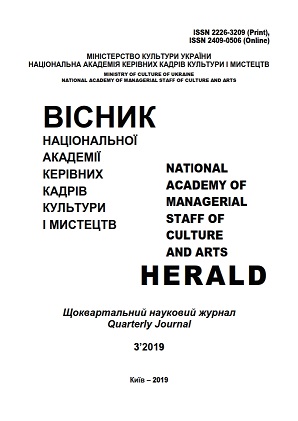Post-Communist Culture in the Metamodern Mirror: A Discourse Analysis
Post-Communist Culture in the Metamodern Mirror: A Discourse Analysis
Author(s): Tatyana Kostyantynivna Gumenyuk, Yuri Gryhorovych LegenkiySubject(s): Cultural history, Social Philosophy, Culture and social structure , Sociology of Culture, Post-Communist Transformation
Published by: Національна академія керівних кадрів культури і мистецтв
Keywords: postcommunist culture; postmodernism; metamodern; discourse; rhetoric;
Summary/Abstract: The purpose of the article is to carry out a discursive analysis of a post-communist culture in the context of metamodern. The methodology consists of theoretical-interpretational models of discourse analysis of post-communist culture, which is carried out in the article as a poetic and rhetorical interpretation of the discourse of the power of Soviet and post-Soviet culture. The monism of the use of the increasing synecdoche in the "Soviet culture" in the post-Soviet culture has multiplied, the synecdoche is replaced by metonymy, which, in turn, represents the metaphorical transformations of speech. Scientific novelty consists in revealing the features of the imaginative constellations of the rhetoric of the post-Soviet discourse, which have a composite, mannerist character without clearly defined ideological, ethical, aesthetic priorities of interpretation and description of cultural values. Conclusions. The discourse of post-Soviet culture demonstrates the traditional rhetorical instrumentality characteristic of the Soviet culture because the monism of increasing synecdoche is pluralized, the speech has signs of a mannerist discourse, in which the composition as cultural integrity is formed by a composite mixture of syntagm without prioritizing combination definition. Metamodern, as a widely stated paradigm of cultural creation, describes the grammatical whole only as relativistic syntax – a-topos, which even by the models of the Liege school of neo-rhetoric is a fragmentary and overly metaphorical description of cultural creation. The "completion" of the rhetorical model of discourse to the cultural provides adequate horizons for discursive analysis, which must be cultural and be formed on the basis of a reconstruction of postcommunist culture as a manneristic (composite) integrity. Therefore, the problem of the post-communist culture functioning in the contemporary space of cultural creation requires the instrumental discursive analysis regarding the presentation of meaning, figurative and cultural constants, and transformative mechanisms of the text.
Journal: Вісник Національної академії керівних кадрів культури і мистецтв
- Issue Year: 2019
- Issue No: 3
- Page Range: 14-19
- Page Count: 6
- Language: English

